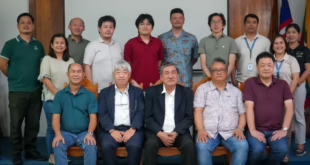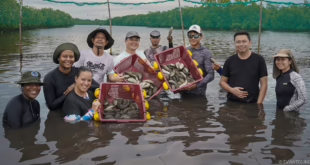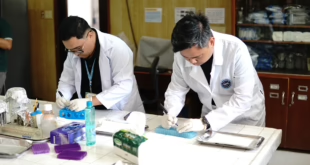by Development Communication Section
Involvement of the community in SEAFDEC/AQD research projects was lauded by external evaluators as a positive development to make technology transfer faster and more effective.
Recounting how SEAFDEC/AQD research was just an academic undertaking in the past, Dr. Carlos Baylon of the University of the Philippines Visayas, noted that this later evolved to include technology packaging and dissemination.
“Now I am hearing the next stage which is the involvement of the community. I think this is a good strategy so that the technology transfer will be faster and more effective, from the researcher to the community. I think this is a good thing so I would like to commend SEAFDEC for this evolving research philosophy,” Dr. Baylon added.
Dr. Baylon was one of the external evaluators during the 2016 Annual Progress Meeting under the ASEAN-SEAFDEC Consultative Group Mechanism funded by the Government of Japan-Trust Fund (GOJ-TF) held 9 February 2017 at SEAFDEC/AQD’s Tigbauan Main Station.
The meeting reviewed 12 research studies that are part of two programs funded by GOJ-TF: (1) reinforcement and optimization of fish health management and the effective dissemination in the Southeast Asian region and (2) environment-friendly, sustainable utilization and management of fisheries and aquaculture resources.
Dr. Joselito Somga, an evaluator from the Department of Agriculture-Bureau of Fisheries and Aquatic Resources (DA-BFAR), also noted the good results of SEAFDEC/AQD’s research into alternative sources for fish meal and expressed support towards involving the community in research programs.
“BFAR is willing to collaborate for the technology transfer of these projects so that the rural community will benefit from these projects,” Dr. Somga remarked.
Dr. Takuro Shibuno, Director of the Research Center for Aquaculture Systems, Fisheries Research and Education Agency and Former SEAFDEC/AQD Deputy Chief, also remarked on the importance of SEAFDEC/AQD’s study on aquasilviculture given that “mangrove ecological function is very important for the farmers and small-scale aquaculture.”
“All the inputs of the current projects are very impressive,” over-all GOJ-TF fund manager and SEAFDEC Deputy Secretary-General Dr. Kaoru Ishii said while noting that the comments and suggestions given by scientists during the progress meeting are helpful in refining SEAFDEC/AQD’s research projects funded by Japan.
In closing, Research Division Head Dr. Evelyn Grace Ayson explained that SEAFDEC/AQD has indeed shifted from “purely academic research and publication, to publication and technology dissemination, and to the current publication plus technology dissemination plus community involvement.”
“It is good to hear that we are on the right track,” she added. Likewise, she encouraged all the study leaders to revisit the proposed deliverables and timelines so that next year there will be more progress and more exciting results.
Dr. Chihaya Nakayasu, SEAFDEC/AQD’s trust fund manager and Deputy Chief, thanked the study leaders and the rest of the staff for all the efforts made in their reports. He also acknowledged the evaluators for their important and insightful comments.


Fisheries Research and Education Agency, Dr. Joselito Somga of the
Department of Agriculture-Bureau of Fisheries and Aquatic Resources and
Dr. Carlos Baylon of the University of the Philippines Visayas.
Rightmost is SEAFDEC Deputy Secretary-General Dr. Kaoru Ishii
 SEAFDEC/AQD Southeast Asian Fisheries Development Center | Aquaculture Department
SEAFDEC/AQD Southeast Asian Fisheries Development Center | Aquaculture Department



